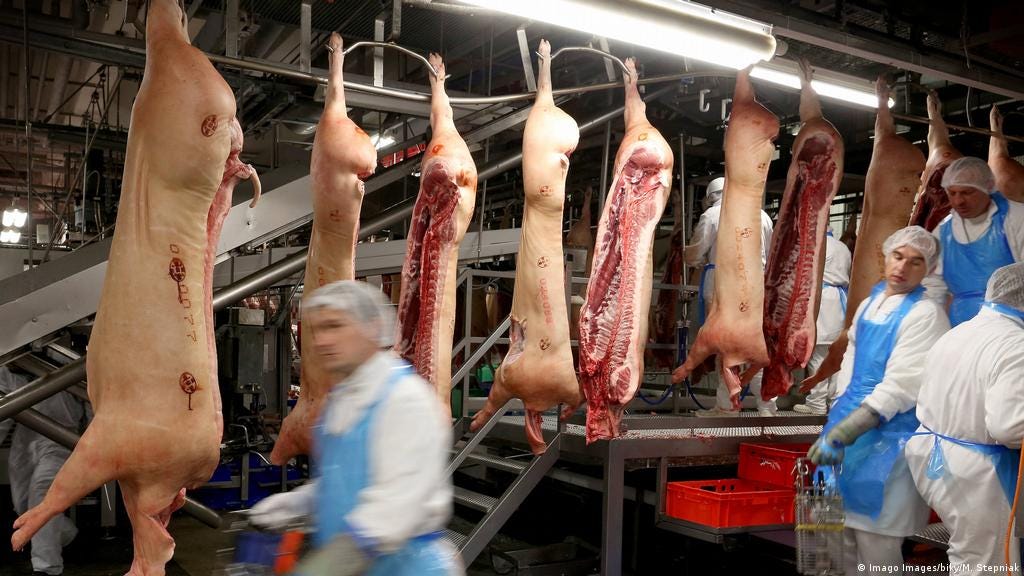Have you ever wondered why tech companies are obsessed with fake food?
It seems every month a new frankenfood startup announces millions in VC funding, while expounding on the environmental, energy, and ethical benefits of their products which are obviously harmful to all life on earth.
It’s both easy and ineffectual to call them evil, accuse them of making us sick for profit, and to continue scrolling twitter while they marshall their resources and plot the destruction of agriculture.
We must know our enemy in order to defeat them.
And to do that, we must start by understanding why VCs give them all that money.
What do VCs want
When you invest in the stock market, a 20% return would be an amazing year.
But when VCs invest in a startup, they want at least a 100x (9,900%) return.
Why?
Because most startups fail, so when VCs invest, they actually invest in a “round” of e.g. 10 startups, expecting 9 to fail completely.
The one that succeeds must not only make back the total investment (10x), but return even more (another 10x) in order to make the whole round worthwhile.
So how do VCs find companies that can grow more than 100x in value?
They look for potential monopolies.
And to be a monopoly, you must scale to sell to a whole industry, and the eliminate all of your competitors
How to become a software monopoly
In software land, where VCs have invested most of their money for the past 40 years, this is not very difficult.
To become a software monopoly, all you need to do is write an app and make sure everyone uses it.
Once all your friends are on it, you wouldn’t want to use any alternative. Facebook, Airbnb, and SnapChat are classic examples.

This is called the network effect, and it’s why tech companies are so successful.
Airbnb has all the guests and all the hosts
Amazon has all the customers and all the products
Uber has all the riders and all the drivers
And since you just have to write software once to support billions of users, it’s relatively easy to scale.
Real world monopolies
But in the world of atoms, that’s a lot harder.
If you make a successful product, a million competitors will undercut you on price so you can’t charge whatever you want.
There is also no protection from network effects, since e.g. your Chevy doesn’t make my Ford drive any worse.
With such competition, you can’t make those sweet 100x+ returns. You can’t be a monopoly.
But there is one exception…
Patents
The only hope you have when selling a physical product is to patent something. This is how all the old school corporations of the 20th century succeeded.
Bayer Aspirin, Band-Aids, Ford, the lightbulb, the telephone.
All of them had a patent.
For the first 20 years of the light bulb, no one else was legally allowed to make one. And that gave Thomas Edison a pretty good head start.
But in order to patent something, there’s a catch: it must be completely new.
And since food is the oldest product in the world, creating a food monopoly is a bit tricky.
How to become a food monopoly
Even today, food is surprisingly decentralized. There are very few industries left where hundreds of small producers exist in every state.
The reason is because food, and meat in particular, is not very scalable.
The sins against nature one must commit in order to scale animal production are almost unspeakable, and they rightly infuriate vegans and carnivores alike.
Even if you could make all the food in one facility, without a patent, you’d have no protection from competitors, who are often more efficient at smaller scale.
So farms are off the table.
In order to create a food monopoly then, what must you do?
Get rid of the farms, and
Make food patentable
Existing Solutions
It’s not as if tech is opposed to patenting meat. They’ve tried, after all.
The problem is that it’s hard to compete with a product that can reproduce. And GMO beef isn’t enough of an improvement to warrant the cost to farmers.
The same is true with GMO crops. Selective breeding can give farmers most of the qualities they want out of their seeds.
Why buy fake seeds when you can just grow normal ones?
What is at stake?
The US meat industry is $170B.
Yes it’s a huge number, but that revenue is spread over thousands of meat producers.
While Tyson, the biggest meat company, is responsible for 26% of that, they still make peanuts compared to Google ($180B).
Now what if a hypothetical meat monopoly could own 100% of this market?
That would put them on par with Google, which is one of the most valuable companies in the world.
Now take seed oils for example. Another $100B industry, split over dozens of competitors.
What if you could invent an oil that replaced the entire market, and only you were allowed to sell it?
You’d be a $100B company.
They “care” about us
This is why everyone “cares” so much about saving the planet, or helping the animals, or even stopping seed oils.
These are merely excuses to promote a categorically new type of food, one which can be patented and used to launch the next $100B monopoly.
And this is why they can’t just invest in regenerative agriculture, or fry everything in tallow.
Motives
No, they’re not dumb, and most are (probably) not evil.
They are just thinking in monopoly mode, and are unprincipled enough to use whatever rhetoric is necessary to convince people and government to support their financial goals.
And while some of the more passionate and naïve founders may believe their own BS, the VCs just smile and write $37M checks while they continue to eat their meat.
Now that doesn’t imply that all monopolies are inherently bad (Band-Aids are pretty solid), but when it comes to food, innovation almost always comes at the expense of health.
Conclusion
Startups are competing fiercely to be the first to market with a viable fake food, free of the constraints of unscalable agriculture, and 100% patentable.
They do so not merely because “they’re evil and want to make you sick” (although that may be true in some cases), but because they must become monopolies to make their investors happy, and you can’t make a monopoly out of nature.
By successfully inventing a new form of fake food, they can legally suppress competition and become a monopoly in one of the biggest markets on earth.
I hope this economic analysis will help elevate the discourse around these dangerous companies, so that we can more adequately fight them without resorting to unreasonable sounding and ineffective arguments.










One of the most important concepts to understand the motives revealed in 2020-2021. "get rid of all the farms." "Care about the environment."
The whole thing falls under the “banality of evil” concept — just a bunch of VCs, monomaniacally obsessed with profit, and overcoming reasonable objections to their product (which many probably never eat) just becomes yet another “objection to handle.”